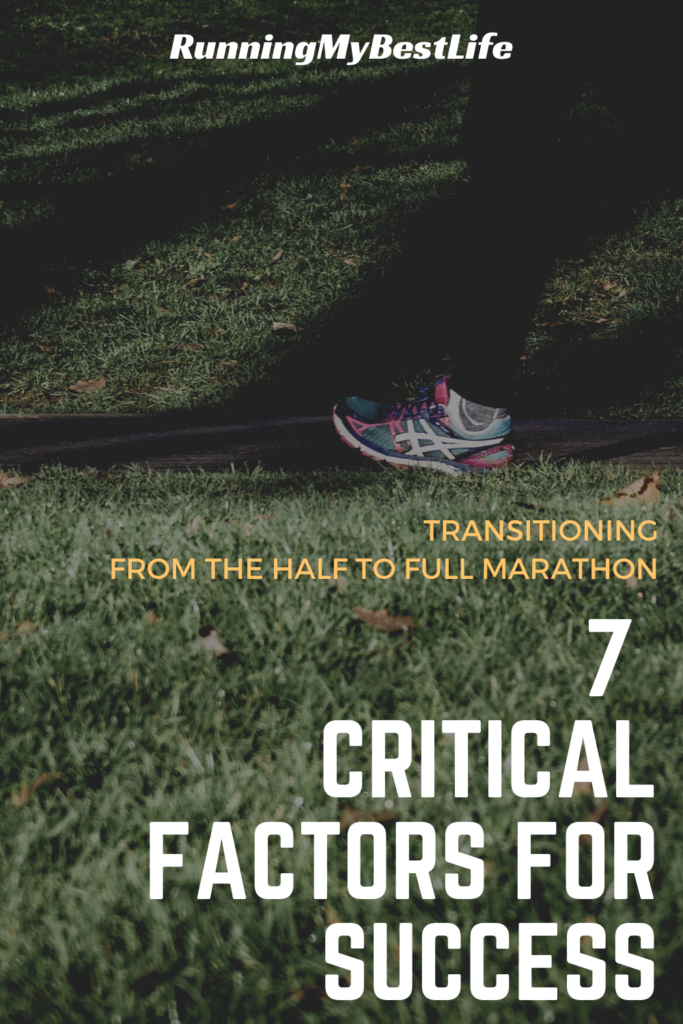After running several half marathons, I started to get this crazy idea that I could run a full marathon. There are plenty of people who do it, so why not me? The truth is, with enough training and patience, anything is possible. This discussion covers a few different factors to consider when making your transition from the half marathon to the full marathon.

Should you run a full marathon?
Many people are completely satisfied with sticking to the half marathon distance, and they should be! The half marathon is an incredible challenge both physically and mentally. For many, getting out there, being active, and having fun is all that matters (and half marathons are more fun than a full anyway!). If this is you, then don’t feel like you’re under any pressure to run a full marathon. You don’t need to jump from the half to a full marathon to be a ‘real’ runner. You ALREADY are a REAL RUNNER.
Related: 6 Reasons to Call Yourself a Runner
On the other hand, if you feel like you want a tougher challenge, you want to see what 26.2 miles is all about, and you want to test your body’s ability to endure some serious pain, then the full marathon might be for you.
7 Factors to consider when you go from the half marathon to a full marathon
Before you jump into a marathon training plan and hit that register button, take a moment to think through your decision logically and see if you have the fitness, time, and energy to commit to a full marathon. Thinking through these factors now will help you plan for the challenges of training. Consider which trade offs you will make now, before you overwhelm yourself with training AND life responsibilities.
Do You Have Enough Time to Train?
There are 2 different elements to time:
- Do you have enough weeks before your race to gradually and adequately prepare your body to handle the stress of running 26.2 miles without breaking down or seriously risking injury?
- Do you have enough hours in your week to devote to running, strength training, stretching/foam rolling, preparing healthy food, and sleeping, in addition to your regular commitments such as work, family, keeping the house running, etc?
The Number of Weeks Before Your Race
First, we’ll address the weeks before your race issue of time. If you have a really solid running base and are regularly running 20-30 miles per week, then 12 weeks is considered the minimum length of time you need to prepare for a full marathon. Less than 12 weeks is a bad idea and typically results in injury from trying to increase miles too much, too fast. You can also find many programs in the range of 16, 18, 20, or 24 weeks prior to your race. Most of Hal Higdon’s Marathon Training Plans are 18 weeks, but his “Personal Best” Training Plan is 30 weeks long.
The longer the plan, the more time you have to allow your body to make gradual improvements. However, some people can lose interest and motivation over such a long plan. Know yourself and if this is you, you might need to do a base training plan first, then jump into a marathon-specific plan after your body is already “in shape”. A longer plan also helps you prevent injury by making more gradual increases in mileage rather than aggressive ones. With a short plan, you have less time, so the mileage increases more quickly and allows your body less time to adapt to the stress. Thus, a rush to get into marathon shape often results in injury for runners.
Related: 4 Injury Prevention Fundamentals for Runners to Live By
How Many Hours in a Week You Can Devote to Training
Second, we’ll address the hours in a week you can dedicate to training for a marathon. First, you need to make sure you have time to sleep 7-8 hours per night. If you get up earlier in the morning to run, this means you need to go to sleep earlier. I recently read the book Why We Sleep by Matthew Walker. It was a real eye-opener to how much sleep does and what happens when we consistently get less than 7 hours per night.
Related: How to Improve Sleep Quality for Runners
Next, do you have enough hours to actually complete all of the miles prescribed by your training plan? In the beginning, many of your runs will only take an hour or less. As the plan progresses, your midweek runs can take up an hour or more. Some even up to 2 hours depending on your pace. One day per week, plan to commit a several-hour block to complete the long run, perhaps on a weekend morning. Do you have the time to do this, or are there other commitments that you may need to rearrange? If you have kiddos to care for, is your spouse or someone else in your support system able to watch them while you run? Personally, I had to scale back time spent writing and promoting this blog to make room for my marathon training.
Beyond time spend ‘on the run’
When considering the hours in your week you will need to commit to, also account for strength training, stretching, and foam rolling. Too many people underestimate the need for these aspects. Many runners make the mistake of pushing these off their schedule when they don’t have enough time or when they need an extra rest day. Strength training, foam rolling, and stretching are keys to a solid injury prevention plan.
Lastly, do you have enough time to plan your meals, go grocery shopping (or order your groceries), and prepare meals so you have good nutrition to fuel your runs. As your miles increase, your hunger will as well. It’s important to make sure you’re fueling your body with good nutrition so you can recover after each and every workout. I’ve also found that when I fail to plan healthy food ahead of time and have it ready to go, I’m more likely to rely on junk food to fill my “RUNGER”, which unavoidably leads to weight gain. Fuel up on the good stuff and minimize the junk.
Related: Nutrition for Runners: 5 Core Eating Habits to Follow

Is Your Body Ready to Handle the Mileage?
Before you start training for a full marathon, you should be comfortable running 20-30 miles per week. This way, your body will be used to a certain level of basic mileage, which will make it easier on you as you push upwards into 30 and 40 miles per week. In addition, make sure you’ve addressed any weak areas such as strength training or flexibility prior to starting your marathon training plan, and have a way to incorporate those two key injury prevention strategies into your training schedule.
Related: What is Base Training and How to Build It
If you’re overcoming an injury, ask yourself if you’ve taken enough time to heal and build a solid foundation. This will help you progress from a solid position moving forward. If you were injured recently, understand that you might have to be flexible in your marathon training plan. Listen to your body. Be patient with yourself. If the longer runs and higher mileage are aggravating the injury, leave your emotions aside. Consider what course of action will be best for you in the long run (haha—pun intended). Consider working with a Physical Therapist who is familiar with distance running.
Do you have a good strength training foundation?
Strength training is a key component to supporting a strong stride and correcting any muscle imbalances. Over time, an unbalanced stride could put undue stress in a certain spot and brew up an injury. Incorporate strength training 3 times per week if you’re working on correcting a weak area. Do it least 2 times per week for preventative maintenance.
Related: Why Runners Need Strength Training
Could your nutrition habits use some improvement?
This is where most runners struggle. Going out and doing the runs is easy most days. Controlling what you put in your mouth is a whole different deal.
If this is you, then training for a marathon is a great time to focus on improving your nutritional habits. Coach and sports nutritionist Matt Fitzgerald outlines the 5 core principles for endurance athletes to follow when planning their nutrition:
- Eat Everything
- Eat Quality
- Eat Carb-Centered
- Eat Enough
- Eat Individually
To learn why these 5 habits work for endurance athletes around the world, pick The Endurance Diet. Or, head to the “Nutrition for Runners” article on how to incorporate each of these habits into your diet.
Related: Nutrition for Runners: 5 Core Eating Habits to Follow
Can you handle your goals being postponed if you can’t race on your scheduled day?
This is an emotional question, and it taps into your running “Why”. Are you just going for a one-and-done race or training for a marathon because you want running to be part of your lifestyle? If your race is cancelled or you can’t run due to an injury, will you throw in the towel or find another race?
Related: Find Your Running Motivation “Why”
In 2020, nearly all of the races were either cancelled or postponed due to COVID-19. Some runners decided to keep running and schedule another race, and others ran virtual races on their own.
Other years when races are still going on as planned, many runners get injured during the process of increasing their miles to prepare for the marathon distance, and they have to take some time off of training. Depending on the timing of their injury, they may need to sit their scheduled race out and wait until they are stronger before racing. The question is, are you mature enough in your running to understand that while you can chase the goal of one race with all your gusto, there will always be another race later?
Are you thinking about taking the leap from the half marathon to the full marathon? What’s holding you back?

Run Happy,
Alexis
- Nailing Your Marathon Hydration Strategy: A Comprehensive Guide
- Conquering Marathons in the Cold: A Comprehensive Guide
- Harnessing the Power of Technology for Successful Marathon Training
- Mastering the Marathon: The Ultimate Guide to Nutrition and Training
- Ultimate Guide to the Top 5 Running Shoes for Beginners in 2023
About Me: I’m Alexis, Founder of RunningMyBestLife! I am an avid recreational runner, half marathoner, wife, dog mom, busy professional, downhill skier in Northern Utah. My mission is to help new enthusiasts fall in love with the sport of running. I believe that running is a catalyst to taking control of your life and living your best life by design. Learn More –>